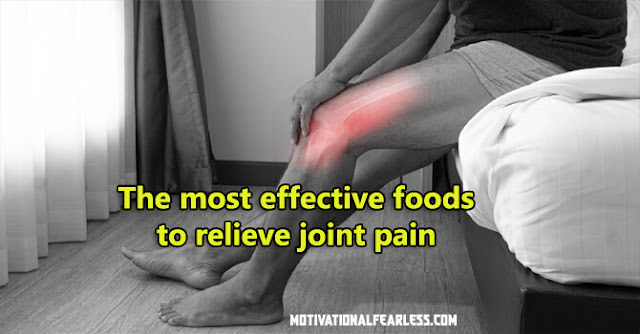The most effective foods to relieve joint pain
By choosing the right foods and avoiding those that can promote inflammation, you can help relieve your joint pain and improve your quality of life.
Joint pain can be extremely bothersome and significantly affect quality of life. If you suffer from chronic joint pain, you're probably looking for ways to relieve your symptoms without having to constantly take medication. The good news is that your diet could play a key role in managing your joint pain.
Here's how certain foods can help relieve joint pain, as well as which foods to avoid. We will also present you with a joint-friendly diet plan to help you manage your pain overall.
How diet affects joint health
Your diet can have a significant impact on the health of your joints. Certain substances found in foods can promote inflammation, while others have anti-inflammatory properties. Chronic inflammation is often associated with joint problems such as arthritis.
The goal is not to completely eliminate inflammation, as it plays an important role in healing and protecting the body from infection. However, reducing excess inflammation can help alleviate joint pain and improve your quality of life.
Foods to choose to relieve joint pain
Certain foods have anti-inflammatory properties and can help relieve joint pain. Here are six foods to include in your diet to help manage your symptoms:
Fish rich in omega-3: Fish like salmon, trout and mackerel are rich in omega-3 fatty acids, which have anti-inflammatory properties. Omega-3s can help reduce inflammation in joints and relieve pain. Try to include fish in your diet at least twice a week.
Cruciferous vegetables: Cruciferous vegetables such as broccoli, cauliflower and Brussels sprouts are rich in phytochemicals with anti-inflammatory properties. Try to include these vegetables in your meals regularly, whether in salads, soups or stir-fries.
Turmeric: Turmeric is a bright yellow spice commonly used in Indian cuisine. It contains curcumin, a compound with anti-inflammatory properties. You can add turmeric to your dishes or take curcumin supplements to help relieve joint pain.
Yogurt: Yogurt contains beneficial bacteria for gut health, which can help reduce inflammation throughout the body. Make sure you choose yogurts with live, active cultures to get all the benefits. You can also add fruit to your yogurt for added flavor and anti-inflammatory effects.
Ginger: Ginger has antioxidant and anti-inflammatory properties thanks to a compound called gingerol. Ginger has been shown to be effective in relieving joint pain in conditions such as osteoarthritis. You can add fresh or powdered ginger to your dishes, or even prepare a ginger infusion to benefit from it.
Green tea: Green tea is rich in polyphenolic compounds with anti-inflammatory effects. It can help reduce inflammation in the joints and relieve pain. Try to drink green tea regularly and preferably opt for certified organic varieties to avoid pesticides.
In addition to these specific foods, following an overall diet can help reduce inflammation and relieve joint pain. The Mediterranean diet, in particular, is known for its health benefits, including its ability to fight inflammation.
The Mediterranean diet is characterized by a high consumption of fruits, vegetables, legumes, unsaturated fats of plant origin, whole grains, nuts and seeds, fish and seafood, as well as regular use of herbs and spices. On the other hand, processed foods, red meat, refined grains, added sugars and dairy products are limited.
By following a Mediterranean diet, you can reduce inflammation in your body and potentially reduce your reliance on anti-inflammatory medications.
Foods to avoid to relieve joint pain
In addition to choosing the right foods, it is also important to avoid foods that can worsen joint inflammation and pain. Here are some foods to avoid or limit in your diet:
Added sugars: Added sugars, such as those found in soda, candy, and baked goods, can increase inflammation in the body. Limit your intake of added sugars and instead opt for natural sweeteners such as honey or fruit.
Refined grains: Refined grains, like white rice, pasta, and white bread, have a high glycemic index, which can increase inflammation. Instead, opt for whole grains, such as brown rice, whole-wheat pasta and whole-wheat bread.
Unhealthy fats: Saturated fats found in fried foods, fatty meats and full-fat dairy products can contribute to inflammation. Choose healthy fats such as olive oil, avocados and nuts to reduce inflammation.
Processed foods: Processed foods often contain inflammatory ingredients such as trans fats and chemical additives. Try to limit your intake of processed foods and opt for fresh, unprocessed foods whenever possible.
Next steps to relieve your joint pain
If you experience persistent joint pain despite dietary changes, it is important to consult a healthcare professional. Your doctor will be able to evaluate your symptoms and determine if there is an underlying condition that requires medical treatment.
In addition to your doctor, a dietitian can help you personalize your diet based on your specific needs. They can also help you identify possible food sensitivities or intolerances that could be contributing to inflammation.
It is essential to remember that diet cannot completely cure joint problems, but it can play an important role in managing symptoms. Combined with other treatment approaches, a healthy, balanced diet can help you live comfortably with your joint pain.
By choosing the right foods and avoiding those that can promote inflammation, you can help relieve your joint pain and improve your quality of life. Remember to consult a healthcare professional for personalized advice and appropriate follow-up. Take care of your joints and take steps to keep them healthy!













Post A Comment:
0 comments: